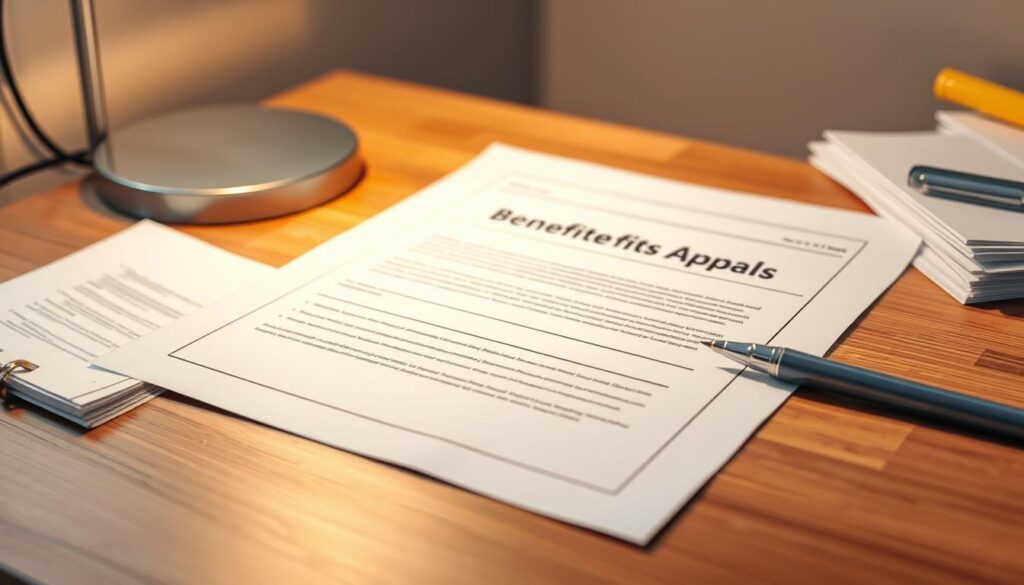When the denial letter arrives, it can turn hope into stress and worry. People depending on Social Security Disability Insurance, Medicaid, SNAP, or unemployment insurance may feel shut out with that first “no”. Yet, with the right approach, it’s possible to revisit and unlock the door to assistance.
This guide walks through how to counter a denial of benefits in the USA. It offers a clear, step-by-step process aimed at helping readers navigate federal and state programs. The focus is on practical steps to take when appealing.
You may also like:
You will remain on the same website.
First steps after a denial include gathering evidence and drafting an appeal. Also covered are filing deadlines, preparing for hearings, and when to get legal help. The guide is designed to be factual and straightforward, helping readers build a strategy for appeal.
Following this guide helps readers create a comprehensive plan. Quick action ensures appeal rights are secured, beginning the process to regain essential support.
Key Takeaways
- Act quickly after a denial to preserve appeal rights and meet deadlines.
- Gather medical records, pay stubs, and official correspondence as core evidence.
- Follow a clear structure when drafting an appeal letter and include cited facts.
- Understand the types of appeals and what happens at a hearing.
- Consider legal assistance if complexity or deadlines threaten the case.
Understanding the Benefits System in the USA
The USA offers a mix of federal and state benefit programs. These assist individuals dealing with disability, low income, unemployment, and veteran status. Knowing who runs each program simplifies the process. It helps especially when you need to appeal a denied claim.
What Types of Benefits Are Available?
Big federal programs like Social Security Disability Insurance (SSDI) and Supplemental Security Income (SSI) exist. SSDI considers your work history and the payroll taxes you’ve paid. SSI checks if you’re in financial need and disabled.
Medicare is for older or certain disabled folks. Medicaid helps low-income people, following federal rules but run by states. SNAP provides food aid based on your income and how many live in your household. TANF gives cash and other help to needy families. Unemployment benefits rely on your job history and are managed by each state. Veterans’ benefits link to military service and disabilities from it.
Different programs have different rules to qualify, like how much you earn, your past jobs, if you’re disabled, served in the military, or your family size. Knowing which rules are federal or state-specific is crucial. This knowledge is key when appealing denied benefits in the USA.
Related content:
You will stay on the same website.
How the Application Process Works
Applications usually start with forms online, in person, or by mail. You’ll need proofs like medical reports, recent pay, and who’s in your family. Then, the agency reviews your case and responds in writing.
If your claim gets denied, you’ll get a notice. It tells you why, what appeal form to use, and when to file it. For some benefits like SSDI and SSI, they check your health. Others, like SNAP and unemployment, look at your income and job history.
Read your denial notice well to understand how to appeal. There’s guidance online from federal and state agencies. Having clear records and filing on time help when you’re appealing through the official process.
| Program | Administered By | Primary Eligibility Factors | Common Evidence |
|---|---|---|---|
| Social Security Disability Insurance (SSDI) | Social Security Administration | Work history, disability meeting SSA rules | Work records, medical exams, treatment notes |
| Supplemental Security Income (SSI) | Social Security Administration | Low income, assets, disability or age | Bank statements, medical records, ID |
| Medicare | Federal (CMS) with SSA enrollment | Age 65+, certain disabilities | Proof of age, entitlement documentation |
| Medicaid | State agencies | Income, household composition, disability | Income proof, household documents, medical records |
| SNAP | State agencies | Income limits, household size | Pay stubs, rent receipts, ID |
| TANF | State agencies | Low income families with children | Proof of children, income, job search records |
| Unemployment Insurance | State labor departments | Recent work and earnings, job loss through no fault | Pay stubs, employer info, separation notices |
| Department of Veterans Affairs Benefits | U.S. Department of Veterans Affairs | Military service, service-connected disability | Service records, medical evidence, VA forms |
Reasons Benefits May Be Denied
Many times, benefits applications don’t succeed for various reasons. A quick check can show what needs fixing or if an appeal is worth it. Learning why benefits often get denied and giving correct info can make the process quicker and more likely to succeed.
Common Denial Reasons
Lack of enough medical proof is a big reason for denial in disability claims. This can happen with missing doctor’s notes, tests not fully done, or not enough info from health providers.
Not meeting deadlines or not filling out forms fully can lead to an automatic no. This is common for benefits like SNAP, TANF, and unemployment. Having too much money or property can also cause denials for programs like Medicaid.
Not going to required meetings can stop your application. Mistakes in paperwork or identity mix-ups happen too. They need fixing to move forward.
Differences between what you report and what’s checked can make agencies pause your claim. Not having enough work credits can cause SSDI to say no. VA claims might get stopped if military records don’t match needed criteria.
Technical issues, like problems with online forms, are also reasons for denial. Many of these problems can be fixed and are part of the appeal process.
The Importance of Accurate Information
Wrong or missing info can delay or deny your application. Always double-check your personal details, dates, how much you earn, and who gave you medical care before sending forms.
Lying carries big risks. Federal programs can fine you for fraud. Keeping records true and honest helps your appeal if you get denied.
Not having all your paperwork can leave big gaps in evidence. Get your medical and job records, and collect any letters from insurance quickly when denied. These steps are important for appealing.
Sometimes, simple mistakes can be fixed without going to court. Talk to the agency to provide what’s missing or to correct errors. Doing this fast often makes the appeal process easier.
| Denial Cause | Typical Fix | How It Affects an Appeal |
|---|---|---|
| Insufficient medical evidence | Obtain records, secure treating physician statements | Strengthens claim; meets documentary denied benefits appeal requirements |
| Missed deadlines/incomplete forms | File extensions, complete missing fields, request reconsideration | May restore appeal rights if corrected quickly |
| Income/assets exceed limits | Provide clarifying documentation, show exclusions or changes | Requires precise financial records to satisfy reviewers |
| Clerical or identity mismatches | Submit ID, proof of address, corrected forms | Often resolved administratively; speeds the appeal |
| Failure to attend interviews | Reschedule, provide valid reason, show proof | Timely rescheduling preserves appeal options |
| Technical submission errors | Resubmit files, use alternative upload methods | Quick resubmission avoids prolonged denials |
The Appeal Process Overview
When someone gets a denial notice, the appeal process starts. Agencies will explain what to do next and how to start appealing. It’s important to carefully read the notice, sign any needed forms, and keep track of deadlines for the appeal.
Usually, an appeal begins with a written form or a specific appeal document. The agency records this and sends a confirmation. This early stage might involve a review where agency staff look over the initial decision and any new information provided.
What to Expect During an Appeal
Once the appeal form is filed, the agency goes over everything submitted again. The claimant and the agency share evidence. If things aren’t settled in the early review, the case might go to a formal hearing.
At this hearing, a judge or hearing officer listens to all sides and checks the evidence. This can happen face-to-face or through video. After the hearing, the agency makes a decision based on what they learned.
Claimants will get notices in writing during this process. These notices confirm the appeal was received, list important deadlines, and explain how to provide more evidence. Some cases might even get settled through mediation before going to a hearing.
Different Types of Appeals
There are a few common paths for appeals. They start with an internal review by the agency staff.
A formal hearing with a judge or officer follows for more serious cases. Social Security Disability claims often end up here. If denied again, there’s another step within the Social Security system.
If all else fails, a claimant can take the case to federal court. For issues like unemployment or SNAP, the appeal might stay at the state level. Veterans Affairs claims go from the agency to the Veterans Court.
Appeals can end in different ways, like overturning the denial or partially granting the claim. The process and time it takes vary. For example, Social Security disability appeals take a lot longer than unemployment hearings.
| Appeal Stage | What It Involves | Typical Timeline |
|---|---|---|
| Internal Reconsideration | Agency staff recheck the original decision and new evidence | Weeks to a few months |
| Administrative Hearing | Formal hearing before an ALJ or state hearing officer; testimony and evidence exchange | Months to over a year |
| Appeals Council / Higher Board | Review of ALJ decision by a higher administrative body | Several months to over a year |
| Judicial Review | Federal or state court review after administrative appeals are exhausted | One year or more |
| Mediation / Informal Resolution | Negotiated settlements or agreements to avoid formal hearing | Weeks to months |
Gathering Necessary Documentation
Start by gathering the necessary papers for a strong appeal. Begin with your denial notice and the appeal form. Also, keep copies of your ID, all letters from the agency, and any denial reasons.
Make sure to sort your documents by type. For SSDI/SSI, gather your medical records, doctor’s notes, and test results. Include notes on treatments, medicines, and your abilities. For jobless claims, add your pay records, tax documents, and job separation letters. For SNAP or Medicaid, have your income and bank statements ready, along with proof of your household. And for VA claims, collect your service and medical records.
Your medical documents should clearly show your health condition. Include reports from exams, therapy notes, and doctor’s statements about your health limits and future health. Place tests and treatment plans at the beginning. This way, reviewers can quickly understand your situation.
Organize your papers in a binder or digital folder that’s well-labeled. List documents in order of date and mark the most important pages. Always make copies; keep the originals safe. Keep a list to track what you send, when, and how.
Getting records takes specific steps. Fill out forms to get health files and say yes to HIPAA. Ask past employers for work and pay records. For military files, get official copies from the National Personnel Records Center. Save proof of every request you make.
Store your evidence safely. Keep clear copies and backup digital files securely. Use mail with tracking when sending items. Note every call, visit, and submission with dates and names. This makes your case clear and organized.
Here is a simple checklist to help you gather your materials correctly and quickly.
| Document Category | Examples to Include | Why It Matters |
|---|---|---|
| Denial & Appeals | Denial notice, denied benefits appeal form, written appeal | Shows the official decision and where you start the appeal. |
| Identification | Driver’s license, Social Security card, birth certificate | Proves who you are and supports your claim. |
| Medical Records | Imaging, lab results, treatment notes, provider statements | Shows clear evidence of your health condition. |
| Employment Documents | Pay stubs, W-2s, employer separation notices | Confirms your income and any job changes. |
| Financial & Household | Bank statements, tax returns, household affidavits | Helps prove your need for income-based help. |
| Military Records | DD-214, service medical evaluations, personnel files | Supports your VA claims and connects service to health issues. |
| Communications Log | Timeline of events, phone call notes, appointment dates | Shows how everything is connected over time. |
Avoid mistakes by being thorough. Label sections clearly and check that you meet all appeal requirements. Taking these steps can prevent delays and improve your chances of a successful appeal.
Writing an Effective Appeal Letter

Start by clearly stating you’re challenging the decision. Include your name, address, claim number, and when you got the denial. If there’s a form for denied benefits appeals, fill it out first. Then, attach a detailed letter sticking to the facts.
Structure of the appeal letter
Begin with a clear heading that shows your details again. Start with a brief overview of your appeal. Then, list key dates, treatments, or job history that are important. Follow by explaining why the denial was wrong and cite each evidence piece.
End your letter by asking for a specific action, like a review or hearing. Sign it and include your current contact info. If there’s a format to follow, do so exactly. Always keep copies of what you send.
Important points to address
Challenge the reasons given for your denial with solid facts and documents. Clarify any medical or factual mistakes and provide new evidence. If disability is the issue, be specific about what you can’t do, like standing for only ten minutes or needing daily help.
In cases of unemployment, tell them clearly about your job end and include notes from your employer. Stay formal and precise in your language, avoiding any emotional words. List your evidence clearly and number them for easy reference.
Conclude by saying how you’ll send the appeal. Use certified mail or whatever the agency prefers and keep a record of sending it. Meeting deadlines is crucial, so stick to the agency’s rules to keep your appeal valid. This is key, whether you’re learning how to appeal denied benefits in the USA or navigating the appeal process step by step.
Timelines for Filing an Appeal
Timing is crucial when a benefits claim gets denied. Deadlines change based on the program and state. For Social Security disability, you might need to request reconsideration or a hearing about 60 days after getting the notice. Unemployment appeals usually give you 10–30 days, depending on where you live. SNAP and Medicaid often allow about 30 days for a fair hearing request.
Make sure to read your denial letter closely. It will tell you the final date to appeal and how to submit it. You’ll usually find what you need to do for the appeal noted in the letter. This can include filling out forms, adding your signature, or showing proof of mailing.
The time to appeal starts ticking either from the date on your denial or when you receive it. You’ll need to see if the agency counts every day or just work days. When the deadline is near, how quickly mail gets delivered can really matter.
Some places might let you file late if there’s a good reason. Each program has its own rules for this. If you miss the deadline, you can still try to explain why and submit a late appeal. If needed, a lawyer can help argue your case in federal court.
If you wait too long, you might lose the chance to appeal inside the system. You may have to start over and could miss out on money you’re owed from the past. Then, you might not be able to fight the decision as easily.
It’s wise to move fast. Aim to send your appeal a few days after getting the letter to avoid postal delays. Make sure the agency got it by using certified mail, email with a read receipt, or checking tracking numbers online.
If you’re unsure, reach out to the agency on your denial or talk to a lawyer who knows about benefits appeals in the USA. Taking early action can save your rights and fit within the appeal rules.
Contacting the Right Agency
When you’re looking to appeal a benefit denial, start by reaching out to the agency that denied you. Each program has its own office for appeals. Knowing the right place to go saves both time and keeps you from missing important deadlines.
Finding the Correct Office
For Social Security disability denials, contact the Social Security Administration. The local SSA offices handle initial reviews. The Office of Disability Adjudication and Review oversees hearings. State labor departments manage unemployment appeals. Medicaid and SNAP appeals belong to state Medicaid or human services offices. For veteran issues, reach out to VA regional offices or the Board of Veterans’ Appeals. TANF concerns are for local welfare agencies.
You can find agency contact info on websites such as ssa.gov, benefits.gov, dol.gov, and va.gov. Plus, state websites have details too. Look on the agency’s appeals or forms page for a denied benefits appeal form. Contact details for local offices can help with in-person or mail filings.
How to Reach Out: Tips and Techniques
Always start by calling the official numbers to understand the appeal process and which forms you need. When you can, use the agency’s online portal, like SSA’s online services, for documents. Sending written requests by certified mail keeps track of time-sensitive materials.
On calls, note down the agent’s name, date, and time, and sum up the conversation. Ask for call reference numbers if available. When visiting in person, bring your photo ID and important documents. Email is okay only with secure messaging. Never email sensitive information like your Social Security number or health records.
If you’re not getting anywhere, talk to a supervisor, agency ombudsman, or inspector general. Veterans have the VBA regional offices for escalations. State programs may offer appeals boards or assistance for slow requests.
Those with disabilities or who don’t speak English well should ask for help. Agencies can offer interpreters, alternate formats, and help with forms. Requesting these accommodations early keeps the appeal process moving smoothly.
Preparing for a Hearing
A hearing is your chance to argue against a denial. Getting to know the format and procedures reduces stress and helps present your case clearly.
Hearings can be on the phone, via video, or in person. They start with an opening statement, then witnesses speak, the agency asks them questions, and finally, exhibits are submitted, ending with a closing statement. The judge might decide right away or take time to write a decision.
How long a hearing takes depends on its details. Simple cases might take 30 to 60 minutes. But medical or job-related cases could last longer. All spoken words and shown evidence are officially recorded. Everyone should act as if they are in a courtroom.
What to Expect During a Hearing
Witnesses often include the person appealing, doctors, job experts, and people like family. They talk about the facts and limits related to the case.
Evidence is listed and included in the record. If you need, ask for time limits. To call an uncooperative witness or record, learn the rules for subpoenas early.
You can have a lawyer, look at the evidence beforehand, and question opposing witnesses. It’s ok to ask to delay if there’s new evidence or a missing witness. Judges like to know about any new materials in advance.
How to Present Your Case Effectively
Put your evidence in a binder or digital folder and label it well. Make copies for the judge and others. Having a clear list of exhibits helps during the hearing.
Practicing your words helps stay on track. Focus on real-life effects and daily tasks. Talk clearly about how your symptoms impact activities like lifting or walking.
Medical experts should link your diagnosis to everyday limits. Experts from top hospitals might explain how your health affects your life. Job experts will show how limits affect work skills.
Lay witnesses discuss daily life and specific events. Their stories need to match what the judge is looking for.
To successfully appeal: bring organized evidence, practice focused testimony, and have witnesses that hit the mark. These steps are key in preparing your appeal.
| Stage | Purpose | Practical Tip |
|---|---|---|
| Pre-hearing review | Confirm exhibits, subpoenas, and witness availability | Send exhibit list to the judge and opposing party at least seven days before the hearing |
| Opening statement | Frame the main facts and outcomes sought | Keep statements under three minutes and focus on key limitations |
| Direct testimony | Present factual accounts and expert explanations | Prepare witnesses with bullet-point notes linking evidence to adjudicator criteria |
| Cross-examination | Test the accuracy and consistency of adverse testimony | Answer clearly and pause before responding to complex questions |
| Closing argument | Summarize the record and request a specific outcome | Link exhibits and testimony to legal standards in concise points |
Following these steps will help your appeal process. They bring clarity and respect for the proceedings.
Seeking Legal Assistance
Getting help from a pro can change the game when facing a tough or unfair denial. It’s smart to think about this early on. This is especially true after several denials, when you’ve missed deadlines, or if the medical details are hard to understand. It’s often worth it to hire someone when the appeal involves a lot of back pay or if the other side is pushing hard.
When to Consider Hiring a Lawyer
Think about getting a lawyer if the case has legal pitfalls or tricky rules that could trip you up. Many who apply for Social Security disability get lawyers who only get paid if you win. They get a part of the past-due benefits. For VA claims, groups like the American Legion and Disabled American Veterans offer expert help.
If gathering proof is tough or if you need to prep witnesses for a hearing, get a lawyer. They’re good at finding things you might miss, like a deadline, and know how to meet appeal needs that can be easy to overlook.
Benefits of Professional Help
Lawyers and experts know the rules and how to get evidence that convinces the judges. They write legal documents, get records, ready witnesses, and plan for the hearing to boost your chances of winning.
These pros can guide you on how to challenge a denied benefit in the USA, work through complex health records, and discuss settlements when it’s right. For VA appeals, certified officers and lawyers help file additional claims and stand by veterans at hearings.
Alternative Assistance and Cost Considerations
Groups like legal aid or disability advocates offer help at a lower cost or for free if you qualify. Always check a lawyer’s credentials with the state bar or look at directories for VA and Social Security to confirm they’re legit.
Fees can vary. Social Security often uses contingency fees, while other services might have set charges or hourly rates. Many offer free services or adjust fees based on your income. Always ask for a fee agreement in writing to understand the costs upfront.
Resources and Support
If your application gets denied, knowing where to find help is crucial. The right help from government agencies, nonprofits, and local groups can be a game changer. They can help you obtain records, fill out an appeal form, and explain how to appeal denied benefits in the USA.
Organizations That Can Help
There are key places to look for assistance. The Social Security Administration and its field offices offer direct guidance for disability appeals. You can also get affordable legal help from Legal Services Corporation-funded offices, local societies, and P&A agencies. Veterans have dedicated support from groups like the American Legion, DAV, and VFW. The National Disability Rights Network and the National Employment Law Project are there for disability and unemployment issues, respectively. Benefits.gov provides essential info and tools. And for private lawyers, local bar associations are a good starting point.
Online Resources for Guidance
Many helpful websites exist. You’ll find valuable information on the SSA appeals process, VA.gov for veterans’ claims, and state sites for unemployment, SNAP, and Medicaid hearings. Always get forms and instructions directly from official sites to avoid scams. GovInfo and the Federal Register offer up-to-date regulations, and databases of court decisions can help your case. These resources ensure accurate filing and strong evidence for your appeal.
Additional support is available too. Community clinics, social workers, and food banks offer immediate help. If you’re considering paid assistance, do your research. Verify credentials, ask for references, and check for disciplinary actions. Stay away from anyone promising guaranteed results or asking for big fees upfront. Acting swiftly, staying organized, and using both agency and nonprofit resources can make a big difference in your appeal’s success.



